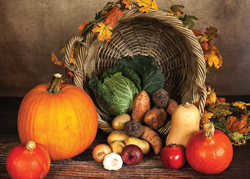Healthy eating has made its way to the forefront of popular culture – organic produce lines grocery store shelves, avocado appears on any modern restaurant menu, every junk food has a fat-free alternative, and greens are cool enough to inspire Beyoncé to rock a “Kale” sweater in her “7/11” music video.
The media has jumped on this bandwagon as well, advertising various products as “superfoods” and switching the focus of dieting from weight-loss to obtaining a healthier lifestyle. However, much of what the media claims are nutritious goldmines that will solve all your dietary problems, may not actually be the key that will unlock the door to a healthier you.
Barbara Baron, MS, RDN, CDN, a healthy eating consultant and adjunct nutrition professor, broke down the superfood phenomenon. She said, “So many foods are frequently touted as ‘superfoods’ – because they may be loaded with vitamins, minerals, and phytonutrients that may help promote health and reduce the risk of certain chronic diseases. This ‘superfood’ title may frequently be used by media because it sounds attractive, yet it is meaningless when we ignore the other food choices and overall lifestyle of an individual.”
True healthy eating requires a healthy lifestyle, not just the occasional superfood. Baron believes, rather than filling your fridge with kale and your cabinets with avocado, “It is better to build a superb eating plan with nutrient-rich foods and mindful eating habits. One that includes eating more fruits and vegetables, lean protein, whole grains, more fiber, and low-fat dairy foods, and being physically active daily.”
Another important aspect of healthy eating is portion control. No matter how nutritious a certain food can be, it loses its value when not consumed in moderation. Baron explained, “Avocados, while rich in key nutrients are concentrated with calories. One cup cubed is about 240 calories, as per USDA National Nutrient Database for Standard Reference – therefore adding too much of this food can unknowingly also increase calorie intake.”
To help with the upkeep of moderation, it is essential to eat a variety of foods to “optimize your nutrient intake”, said Baron. Consuming foods from each food group daily increases the variety of nutrients you take in, ultimately improving your body’s well-being.
Nevertheless, healthy eating as a college student can be a challenge. Between tight budgets and even tighter schedules, finding the time and the funds for a healthy meal may seem impossible. But, a nutritious diet is much more tangible than it seems; it just requires paying a little extra attention at the grocery store.
Ayse Yasas, a senior communication student and founder of the blog “Thrifty Glam Vegan,” shared some of her go-to foods for maintaining a healthy, plant-based diet. She said, “I love quinoa, rice, lentils, beans and frozen vegetables. I can be really lazy, but Wegmans has really awesome quinoa and rice microwaveable pouches, which is super easy for college kids, and frozen vegetables are the same way. I also love buying microwaveable pouches filled with lentils, potatoes, and eggplants that you can eat with rice or quinoa, too.”
Another quick and simple healthy option, that happens to be popular in today’s media, is a smoothie. Emily-Rose Touw, a senior health studies student, said, “College students are always busy and there’s usually not enough time between classes to stop for a meal. Bringing a fresh smoothie from home is a perfect solution because it’s easy to drink during class and can help ensure that students get the nutrients they need throughout the day.”
Touw recommends making smoothies over buying them to avoid unnecessary ingredients like added sugars or sweeteners. Also, you have the ability to customize your smoothie to your individual needs and tastes, which vary based on your level of activity and health.
No single food holds the key to a healthy body. So, when making a grocery list, skip over the media’s favorite superfoods. Instead, opt for a variety of fruits, vegetables, grains, fats, and proteins, and be sure to maintain an active lifestyle. Variety and moderation are the essential tools for building and sustaining a healthier you.
IMAGE TAKEN from Pexels




